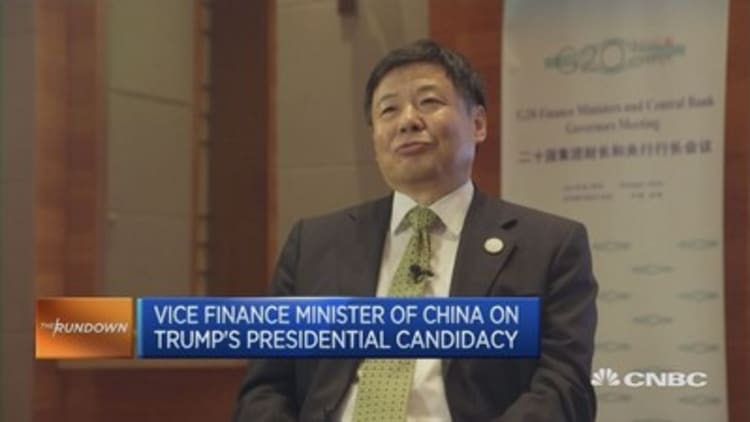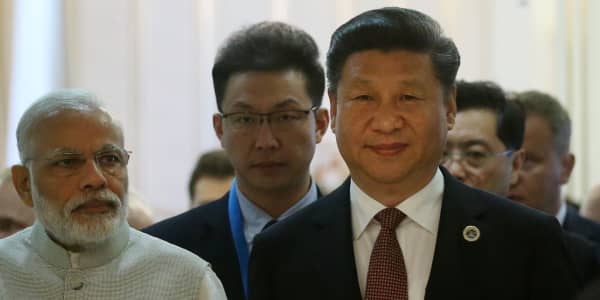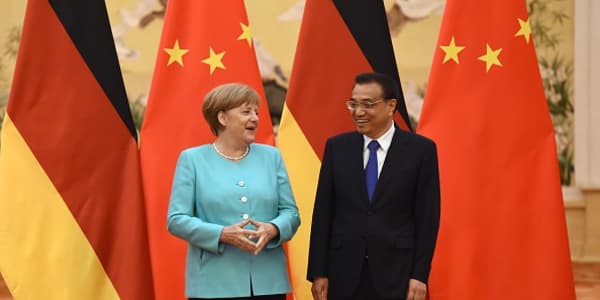
China has no reason to devalue the , as economic fundamentals remained strong, with growth at 6.7 percent in the first half, the country's Vice Finance Minister Zhu Guangyao told CNBC.
Zhu's comments came shortly before Republican presidential candidate Donald Trump lambasted China again, this time for what he said was "devastating currency manipulation."
Trump has employed anti-China rhetoric throughout his campaign, but ramped up his criticism in his high-profile speech at the Republican National Convention in Cleveland, Ohio, on Thursday night local time.
"We are going to enforce all trade violations against any country that cheats," Trump told a cheering crowd of supporters.
"This includes stopping China's outrageous theft of intellectual property, along with their illegal product dumping, and their devastating currency manipulation. They are the greatest that ever came about, they are the greatest currency manipulators ever."
In fact, China's currency had steadily appreciated against the dollar over the past decade, although it recently lost some value against the greenback as the U.S. currency strengthened against almost every other major currency.
Speaking ahead of Trump's speech, Zhu said, "With strong economic fundamentals, we believe the renminbi will continue to keep [its] stability and for the long-term, [there isn't] any reason for the renminbi to devaluate. We will continue to reform the exchange regime of renminbi to reflect the market situation."
He said China had "no specific comments on specific candidates" with regard to the U.S. election race, but believed that economic relations between the two countries were beneficial to people in the U.S. and in China.
The yuan has been trading around five-year lows recently, as concerns over the state of the economy fueled capital outflows. Investors have also expressed concerns over the level of debt built up in the economy.
China suffered almost $700 billion worth of capital flight in 2015, according to the Institute of International Finance. The surge in outflows late in 2015 sparked market concerns that China's foreign reserves weren't sufficient to stabilize the currency by buying yuan over the long term.
Meanwhile, the greenback has strengthened against most major currencies as investors reacted to negative interest rates in Japan and Europe, as well as the possibility the Federal Reserve would continue on its rate-hiking path.
On Friday the dollar/yuan traded at 6.6683 on-shore and 6.6754 off-shore.
China fixes its currency against the dollar every day. In August, China shifted the market mechanism for setting the daily fix, saying it would set the spot rate based on the previous day's close, theoretically allowing market forces to play a greater role in its direction. That resulted in an effective 2 percent devaluation in the currency, a move that sparked fears of a "currency war" to make Chinese exports more competitive.
On Friday the fix was at 6.6669 against the dollar.
China has also been criticized in the U.S. and Europe for allegedly flooding the global steel market with cheap product, hitting U.S. and European producers.
China, which has been a member of the World Trade Organization (WTO) since 2001, has repeatedly denied steel dumping, saying that its steelmakers were simply more efficient and enjoyed far lower costs than their international counterparts.
On Friday, ahead of a meeting of Group of 20 (G-20) finance ministers and central bankers in Chengdu, China, China's Premier Li Keqiang said the country had honored its WTO commitments and exported only a very limited amount of steel.
China was willing to address the steel issue and other sources of tension through talks, Li added.
Economic headwinds
In his interview with CNBC, Zhu acknowledged headwinds for the world's second largest economy, from external events ranging from the U.K.'s vote to leave the European Union trade bloc to domestic factors such as the rise in debt levels in China that the government was trying to address.
"We [are putting in place] reforms, particularly supply-side structural reforms," he said, noting that reducing debt levels was an area of focus.
With China hosting the G-20 in Chengdu this weekend, Zhu said he hoped for a positive outcome.
"We hope our discussion can take that strong monetary fiscal and structural reform policy to promote global economy with sustainable, balanced (and) strong growth."
- Leslie Shaffer contributed to this report.




